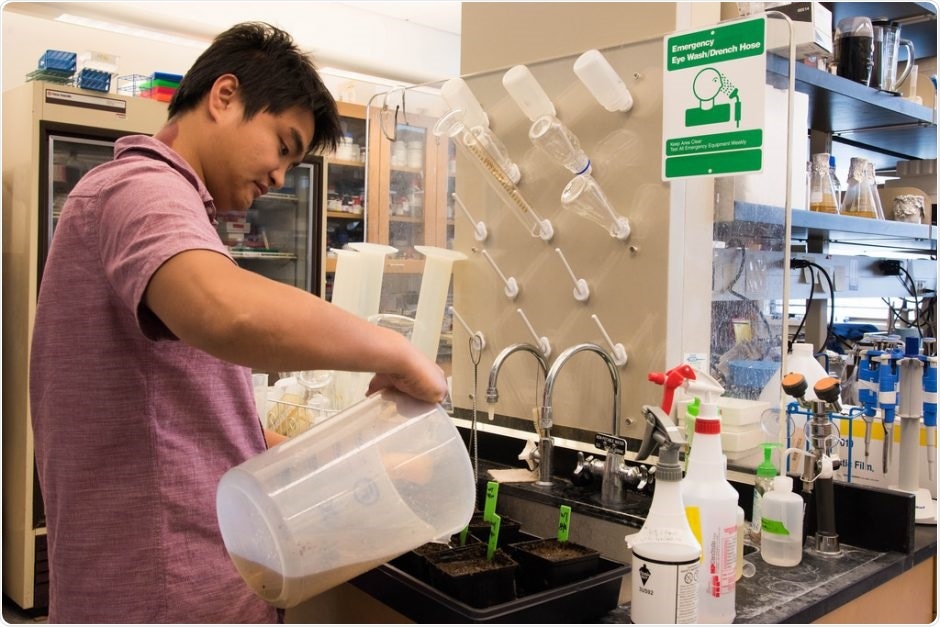Since ancient times, cultures throughout the world have been using vegetable oils, which are traditionally extracted from plants, for food and fuel. A few vegetable oils provide significant health benefits, like reducing the risk of cardiovascular disease and lowering cholesterol levels.

Yajin Ye adds water to the plants in Thelen's lab. Image Credit: University of Missouri.
However, there is a certain difficulty: vegetable oils are usually extracted from seeds or fruits, and during this xtraction process, the rest of the plant is usually discarded.
Jay Thelen, a professor of biochemistry from the University of Missouri, has now identified a new method to improve the production of the chief component of vegetable oil, called triacylglycerol, in plant leaves. With the help of this method, producers could harvest oil from giant, leafy plants that can also be used for other purposes.
For example, sorghum is a global source of grain known for its drought-resistant traits and this grain could play a dual function as a source of vegetable oil, resulting in a crop that is more efficient and valuable
Thelen and Yajin Ye, a postdoctoral fellow working in Thelen’s laboratory at the University of Missouri, used the CRISPR gene-editing tool to “knock out” a group of genes which they have identified to be responsible for controlling the production of fatty acids in the leaves of Arabidopsis—a kind of plant typically used by investigators to examine the biochemistry of plants.
The study findings were recently published in the leading Nature Communications. Journal.
We know that plants synthesize fatty acids when provided light. This study taught us that there are three proteins that restrain this process in leaves, and that we can turn off their cognate genes using CRISPR. That frees up the plant to produce higher amounts of triacylglycerol in the leaves rather than just the seed.”
Jay Thelen, Professor of Biochemistry, University of Missouri
Professor Thelen has two appointments in the College of Agriculture, Food and Natural Resources, and the Bond Life Sciences Center.
According to him, the new technique could result in cheaper and greater production of vegetable oils, and the potential of dual applications for leafy crops, such as soybeans and sorghum, could reduce the burden of producing a higher-oil seed.
That burden usually leads to unwanted consequences—such as a reduction in protein, which happens to be the main component in soybean seeds. At present, Professor Thelen’s laboratory is further testing the new technique on crops to validate its feasibility.
A hunger for research
If there is anyone who is prepared to make this finding, it would be none other than Jay Thelen. Professor Thelen comes from the small town of Seward in Nebraska. But when he found himself in the classroom of Jim Landon—a nationally prominent science teacher with an unconventional style—he has been sincerely pursuing science studies since high school over 30 years ago.
We got out of the classroom and did ecological experiments on nature reserves. We went hiking, assisted with invasive species studies and even helped out on prehistoric digs. We uncovered mastodon bones. It was really impactful stuff.”
Jay Thelen, Professor of Biochemistry, University of Missouri
Landon took Professor Thelen under his shelter, and made sure that he took part in university-caliber studies at the University of Nebraska during the summer time and—sometimes—on weekends as well during the school year.
Landon, who is currently in his seventies and enjoying his retirement in Washington State, clearly remembers his previous student.
“Jay was a great kid; very inquisitive,” stated Landon. “I remember when he was chosen to present his research at the 40th International Science and Engineering Fair in Pittsburgh in 1989. Only a handful of students from Nebraska, Kansas and Oklahoma were selected, and I can still see him standing up there and doing his presentation.”
Landon added, “In high school when the athletes sometimes get all the glory, it was great to see Jay take the initiative to do research and even better to see that initiative rewarded.”
While both student and teacher have taken separate career paths, they still talk to each other now and then, recollecting the effect that had on each other.
While professor Thelen credits Landon for triggering his interest in science, Landon speaks generously of how students, like professor Thelen, have driven his interest in teaching all through his career.
“It just amazes me what the kids I’ve taught have gone on to accomplish,” added Landon. “For Jay’s research to be published in a journal as prestigious as Nature Communications, it just makes me so proud.”
In spite of his significant success, professor Thelen has no plans to take it easy when it comes to research works that fuel his fascination with science.
For me, understanding how plant metabolism is regulated is an itch that needs to be scratched. Plants are the original ‘green' factories for food, chemical feedstock and fuel production. Discovering new metabolic constraints and leveraging these findings to help us adapt to a warming planet—that’s something that motivates me, and there’s still much more to be done.”
Jay Thelen, Professor of Biochemistry, University of Missouri
Source:
Journal reference:
Ye, Y., et al. (2020) Docking of acetyl-CoA carboxylase to the plastid envelope membrane attenuates fatty acid production in plants. Nature Communications. doi.org/10.1038/s41467-020-20014-5.